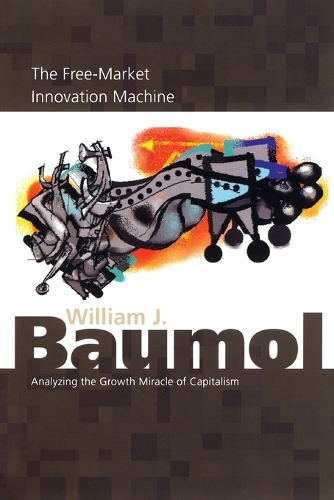
The Free-Market Innovation Machine: Analyzing the Growth Miracle of Capitalism
(Paperback)
Publishing Details
The Free-Market Innovation Machine: Analyzing the Growth Miracle of Capitalism
By (Author) William J. Baumol
Princeton University Press
Princeton University Press
22nd June 2004
United States
Classifications
Professional and Scholarly
Non Fiction
Economic theory and philosophy
330.122
Commended for Association of American Publishers/Professional and Scholarly Publishing: Economics 2003
Physical Properties
Paperback
336
Width 152mm, Height 235mm
510g
Description
Why has capitalism produced economic growth that so vastly dwarfs the growth record of other economic systems, past and present Why have living standards in countries from America to Germany to Japan risen exponentially over the past century William Baumol rejects the conventional view that capitalism benefits society through price competition--that is, products and services become less costly as firms vie for consumers. Where most others have seen this as the driving force behind growth, he sees something different--a compound of systematic innovation activity within the firm, an arms race in which no firm in an innovating industry dares to fall behind the others in new products and processes, and inter-firm collaboration in the creation and use of innovations. While giving price competition due credit, Baumol stresses that large firms use innovation as a prime competitive weapon. However, as he explains it, firms do not wish to risk too much innovation, because it is costly, and can be made obsolete by rival innovation. So firms have split the difference through the sale of technology licenses and participation in technology-sharing compacts that pay huge dividends to the economy as a whole--and thereby made innovation a routine feature of economic life. This process, in Baumol's view, accounts for the unparalleled growth of modern capitalist economies. Drawing on extensive research and years of consulting work for many large global firms, Baumol shows in this original work that the capitalist growth process, at least in societies where the rule of law prevails, comes far closer to the requirements of economic efficiency than is typically understood. Resounding with rare intellectual force, this book marks a milestone in the comprehension of the accomplishments of our free-market economic system--a new understanding that, suggests the author, promises to benefit many countries that lack the advantages of this immense innovation machine.
Reviews
Honorable Mention for the 2003 Award for Best Professional/Scholarly Book in Economics, Association of American Publishers "Mr. Baumol's contribution is not to emphasize the impact of innovation but to pinpoint how competition forces companies to make innovation routine... The traditional analysis ... says that capitalism blunders at generating innovation over the long run. Mr. Baumol ... reverses this presumption... [He] tells a tale rich in details about the market's use of collaboration to overcome problems of innovation. Along the way he turns standard analysis upside down."--Michael M. Weinstein, New York Times "A brilliant book... What makes capitalism uniquely successful is the built-in pressure to generate new products and processes. Provided companies are forced to compete, the market will find a way to generate and diffuse an unending stream of innovations."--Martin Wolf, Financial Times "The book could not be more timely."--David Propson, New York Law Journal "Over the past 50 years, William Baumol has made groundbreaking contributions to a wide range of economic fields, including antitrust, the study of productivity, and the nature of growth... At 80, and still going strong, he is among the last working members of the great generation of post-World War II economists."--Business Week "In this fine volume [Baumol] challenges readers to rethink entirely the conventional wisdom concerning the nature and benefits of the capitalist (or free market) system... [It is] readable, challenging, stimulating."--Choice "For managers looking for a big picture view, this is a useful account. And while it deflates the romantic view of the maverick innovative company, the book justly celebrates the positive results of this routinized 'innovation machine'--the unprecedented growth rates we've had under capitalism."--Harvard Business Review "You cannot fault Baumol for being unambitious. In this fine volume he challenges readers to rethink entirely the conventional wisdom concerning the nature and benefits of the capitalist (or free market) system... Readable, challenging, stimulating."--Choice "An important new book."--David Crane, Toronto Star "Professor Baumol is a giant in the field of economics... This book displays both his prodigious intellect and the sweep of his scholarship... [T]his is an important book."--Ashish Arora, Journal of Technology Transfer
Author Bio
William J. Baumol is Senior Research Economist and Professor of Economics, Emeritus, at Princeton University and Professor of Economics at New York University. The author, coauthor, or editor of more than thirty books, with translations into more than a dozen languages, Baumol has consulted for some of America's best-known firms. His books include "Microeconomics", " Superfairness", and "Entrepreneurship, Management, and the Structure of Payoffs"; among the books he has coauthored is "Productivity and American Leadership".
